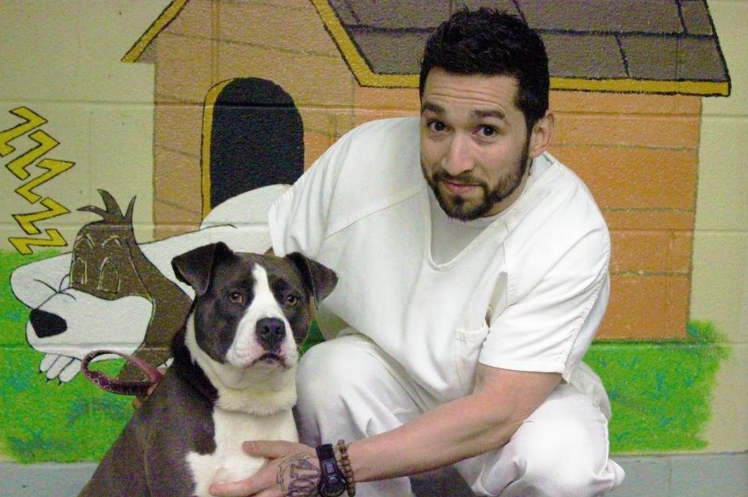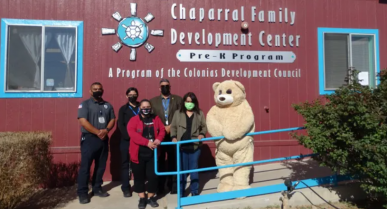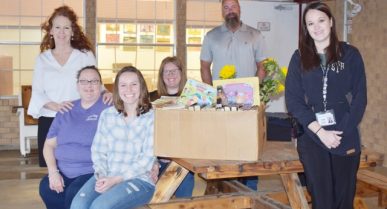NEWS: PAWS of Hope prison program aids foster dogs, trains inmates for life outside
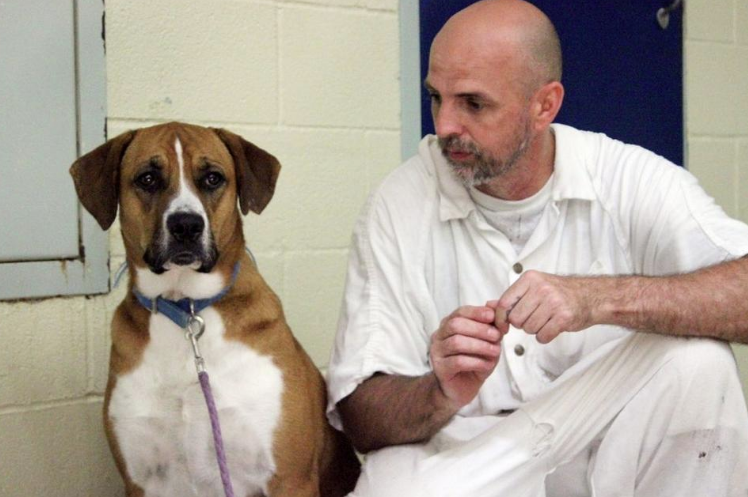
The simplest commands have turned one cellblock inside of a Texas prison into a colorful, dog-friendly haven of hope.
The minimal security prison in Venus, the Sanders “Sandy” Estes Unitof the Texas Department of Criminal Justice, focuses on rehabilitation programs for inmates who have kept a clean record while incarcerated. It does so in hopes of each inmate rejoining the outside world as a contributing adult. According to the TDCJ, 60 percent of inmates will re-offend once released.
“You don’t want someone who was incarcerated who now gets out and has the mentality that they are hard,” explained Amanda Steed, warden secretary of the Estes Unit. “You want someone who is productive and helpful and wants to give back to the community.”
One of the 120 rehabilitation programs, Prisoners Assisting With Shelters — better known as PAWS of Hope — has housebroken about 180 dogs. It has also begun to train the inmates, or caretakers rather, for a return to society.
In 2009, Rene Rodriguez was indicted on two assault charges in Travis County. Three years later, fellow dog trainer Randy Naranjo was charged with an assault and drug-related charges in Harris County. Both men are currently waiting, patiently, for their release date.
Rodriguez was transferred to the Estes Unit in January 2017, and just a month into his arrival joined PAWS of Hope.
“I didn’t think I’d ever be around a dog in prison,” said Rodriguez as he sat on a foldout chair in the small, cinderblock library.
PAWS of Hope teaches the inmates responsibility and accountability while allowing them to give back to the community. The majority of the dogs trained at Estes Unit come from the Alvarado and a few from the Ellis County SPCA.
“We don’t know where the dogs are going, but they come from broken homes — the streets,” Rodriguez relayed. “We come from the streets as well, some of us broken homes. We know where the dogs come from, but they don’t know where we come from.”
Through the program, Rodriguez has learned patience within himself and to control his frustrations. He compared the foster dogs to children, having to teach them the basics and tricks. “The dogs are teachable just like us,” Rodriguez added.
He admitted how tough it is not to get attached. And he is on his fifth dog — Raymond.
Rodriguez dropped his tone and said, “It’s very hard. I was attached mainly to two of them, Beau and Greta. […] They’d sit there and watch me, and I could feel like I could talk to them. I felt like I was talking to someone. I can talk to a person, but they just looked at me with those eyes of love.”
“I know I can give back by just the little things — leash training, kennel training. I’m grateful for this, very grateful. I enjoy being in here with the dogs,” he explained.
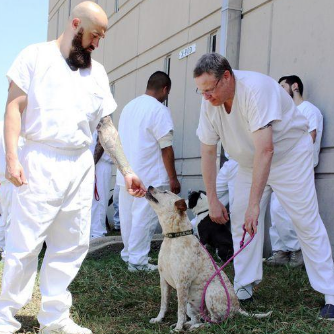 Rodriguez is currently waiting on a judge to decide if and when he will be granted an early release, but if not soon, then December 2019 he will transition into society again.
Rodriguez is currently waiting on a judge to decide if and when he will be granted an early release, but if not soon, then December 2019 he will transition into society again.
“I have a lot of really good avenues — my family. I don’t have any friends, but my family is willing to help me out. I’ve got a job waiting,” he assured.
Naranjo, 30, recently graduated from the prison entrepreneur program and wanted to try something new. The program has impacted his life in a definite time of need.
“I have gone through so much this year; it’s been a horrible year,” Naranjo shared.
The furry companion proved to be the best way to cope with his feelings.
“In the past, I’ve always been a person of self-destruction like I’m gonna shut down and not going to talk to anybody,” Naranjo expressed. “In the program that I went through in the past and more than anything now I understand how veterans and people who have gone through things are given dogs. It brings you peace.”
He arrived at the Estes Unit a few days short of two years ago and entered the Dog Pod almost two months ago.
“Coming in I was a little timid because you don’t know how the dogs are. A lot of them have been gone through some traumatizing experiences in their past, and honestly, we probably have too. At the end of the day, it’s very peaceful and brings a lot of stress relief.”
The program has worked on his patience. He mentioned the unit is like a brotherhood and the inmates helped each other out.
“We don’t accept certain things — we don’t take slackers. We all want what’s best for the dog and when they make that transition back into society, the same way we are making our transition, we want it to be the best.”
MORE ON PAWS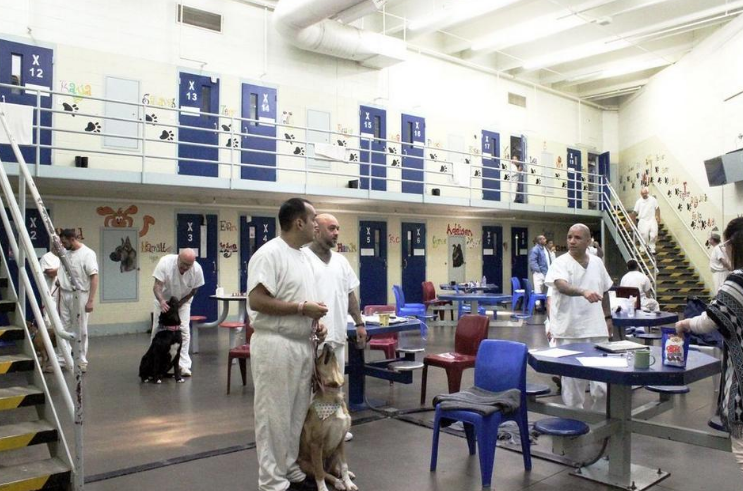
The 120 programs incorporated at the Estes Unit range from education, music, prison entrepreneurship, vocational and chaplaincy programs. With PAWS of Hope, dogs from the SPCA of Ellis County and in Alvarado are brought to the prison to be trained and nurtured by inmates to then be adopted to forever homes.
Steed stated, “We started this in 2009, and ours was actually the first one in the state of Texas.”
Inmates involved with PAWS of Hope are housed in a unit called the Dog Pod. Each cell houses two offenders and one dog. A total of 40 inmates participate at a time. Every 12 weeks the dogs are trained, and graduation is hosted for the dogs and the offenders. The families of the inmates are invited, and certificates are awarded to the dog and inmate.
“Whenever you walk into that pod compared to the others, you see teamwork, the guys not worrying about looking tough or what’s on TV and they are not fighting,” Steed added. “It’s more of a brotherhood.”
Over the years, 180 foster dogs have graduated through the program, and not one pup has been euthanized. Only two dogs have not been adopted. Steed said several of the inmates have adopted the dogs after they leave and even the staff has taken in a few. Four years ago, Steed adopted a dog out of the program.
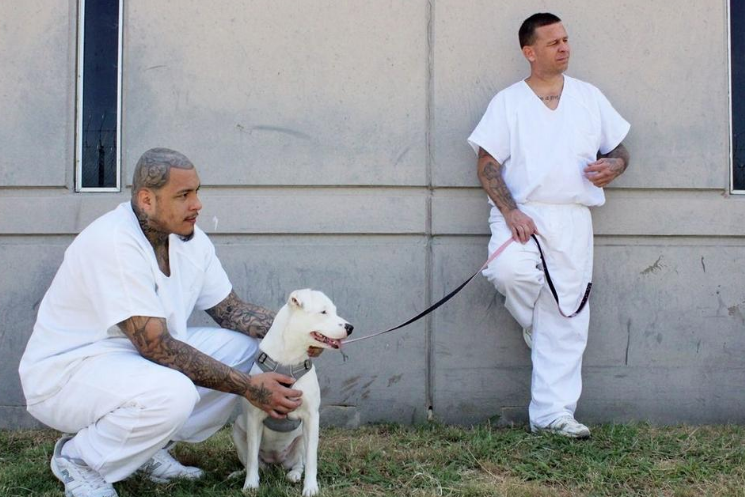 “I think it was a little different for him adjusting from prison life to home life because they are used to not having a backyard 24/7 and are used to being on a schedule,” Steed explained.
“I think it was a little different for him adjusting from prison life to home life because they are used to not having a backyard 24/7 and are used to being on a schedule,” Steed explained.Tiffany McKee, a trainer with the Ellis County SPCA, visits twice a week to work with the inmates. She teaches the basics, and as the guys get educated and gain confidence, advanced techniques are taught. The dogs are even trained to undergo a pat-down search, and they post their paws up on the wall.
Jennifer Johnson has been the shelter manager of the Ellis County SPCA on-and-off since 2006 and in the animal field for 15 years. The visit alongside the Daily Light was the first time she witnessed the prisoners and dogs in action.
“It was amazing,” she relayed. Johnson then emphasized the importance of the program and how the shelter and dogs benefit from PAWS of Hope.
“They don’t have to be in a cage all day and can learn something while they are waiting for the family — they’re learning,” Johnson elaborated. “It’s going to help them find a home and free up five kennels so we can help five other animals at our shelter.”
The dogs brought to Estes Unit are given a second chance. These dogs are harder to adopt out, but once they go through the program, they are more appealing for families, she explained. Johnson shared how shelters do not have a lot of time to love and train the dogs.
The male prisoners at Estes Unit range from 18 to 85 years old and come from a variety of backgrounds. When a dog is introduced into the mix, a team environment is established because they all now have one thing in common besides prison.
To learn more, find PAWS of Hope on Facebook.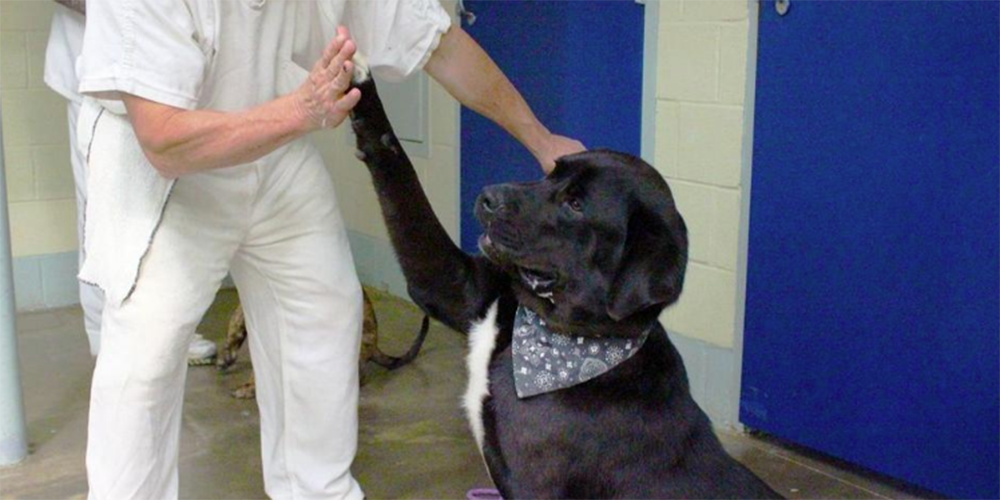
– – – – – – –
Ashley Ford | @aford_news | 469-517-1450
